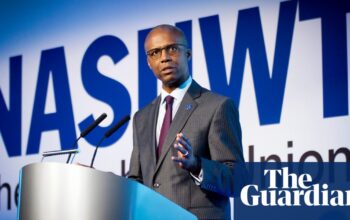
[The decison to impose tariffs] has not come as a surprise, but it’s also fair to recognise that the new president has a speciality in generating uncertainty. It’s part of his style of negotiations to create uncertainty as to what will happen next.
Richard Tice, the Reform UK deputy leader, said the main problem facing the UK steel industry was not the threat of US tariffs, but the high cost of energy.
Alexander replied:
There are other factors that need to be recognised and addressed in the steel strategy, for example, again the indisputable fact that we inherited blast furnaces that were increasingly out of date relative to technologies being used elsewhere.
It is also the case that there had been years of neglect in a number of these plants, where there is significant need for both public and private investment, so I respectfully hear the point [Tice] makes in relation to electricity prices and general power generation prices in the United Kingdom.
11.57am.) Shazia Ejaz, its director of campaigns, said:
The rigid English and maths requirements for apprenticeships are deterring both employers and training providers from recruiting young people who have not yet met these standards, disproportionately affecting the most disadvantaged. Moreover, the relevance of academic-style English and maths qualifications to many real-world workplaces is questionable.
The introduction of shorter apprenticeships is a positive step because it offers greater opportunities and flexibility for both employers and apprentices – which is needed to help economic growth.
Rory Stewart, the former Tory cabinet minister who now probably has more influence over British political thinking as co-host of the Rest is Politics podcast (compulsory listening for centrist dads) than he ever did when he was in government.
To recap: Vance said in an interview:
There’s this old school – and I think it’s a very Christian concept by the way – that you love your family and then you love your neighbour, and then you love your community, and then you love your fellow citizens in your own country, and then after that, you can focus and prioritise the rest of the world. A lot of the far left has completely inverted that.
Stewart, who says he had a slight acquaintance with Vance before he became vice president, responded with a message on social media saying:
A bizarre take on John 15:12-13 – less Christian and more pagan tribal. We should start worrying when politicians become theologians, assume to speak for Jesus, and tell us in which order to love.
At that point the dispute, which started as a theological argument related to the Trump administration’s crackdown on immigration, descended into insults, as Vance condemned Stewart’s “false arrogance” and questioned his IQ in one of his replies
Now Pope Francis has sided with Stewart. In a letter to US bishops, prompted by the “mass deportations” taking place there, he says:
Christians know very well that it is only by affirming the infinite dignity of all that our own identity as persons and as communities reaches its maturity. Christian love is not a concentric expansion of interests that little by little extend to other persons and groups. In other words: the human person is not a mere individual, relatively expansive, with some philanthropic feelings! The human person is a subject with dignity who, through the constitutive relationship with all, especially with the poorest, can gradually mature in his identity and vocation. The true ordo amoris that must be promoted is that which we discover by meditating constantly on the parable of the “Good Samaritan” (cf. Lk 10:25-37), that is, by meditating on the love that builds a fraternity open to all, without exception.
The letter does not mention Vance, Stewart or their spat. But the mention of ordo amoris does seem to be a reference to another of Vance’s replies to Stewart, in which Vance said:
Just google “ordo amoris.” Aside from that, the idea that there isn’t a hierarchy of obligations violates basic common sense. Does Rory really think his moral duties to his own children are the same as his duties to a stranger who lives thousands of miles away? Does anyone?
an inquest which said the SAS soldiers acted unlawfully when they killed the IRA men at Clonoe in County Tyrone.
Davis, a former SAS reservist, said:
Last week’s frankly speculative judgment by the Northern Ireland coroner into the Clonoe shootings now exposes a number of soldiers to potential prosecution. These are men who served their country with honour, heroism and skill, and sometimes in the face of the most incredible danger. They are now mostly in their 60s and 70s, no doubt hoping for a well-earned, peaceful retirement.
Precisely what is the government going to do to stop the vengeful pursuit of decent, patriotic people? If the government leaves them open to persecution, it will be frankly shameful and only to serve to further the IRA’s attempt to rewrite the history of Northern Ireland.
Alex Burghart, the shadow Northern Ireland secretary, backed Davis’s argument. He said the four IRA men killed in the Clonoe ambush “sought to kill, and they operated entirely outside the bounds of the law, and yet we are being asked to believe that the use of lethal force was not justified upon them”. He went on:
I am not a lawyer, but if this is the state of the law, then the law is an ass, and it is up to parliament to change it.
The last government passed a Legacy Act – the Northern Ireland Troubles (Legacy and Reconciliation) Act, to give it its full title – which would have stopped army veterans being prosecuted for killings during the Troubles. But it was opposed by all political parties in Northern Ireland, partly because it would also in effect have given terrorists an amnesty from prosecution over Troubles-era crimes, and Labour is repealing it.
Responding to Davis, Hilary Benn, the Northern Ireland secretary, said:
[The act] was a fatally flawed piece of legislation that has been found in a number of respects to be incompatible with our obligations under the European convention on human rights (ECHR) … This government believes in upholding our commitment to the ECHR even if other members do not share that view.
Responding to another question, Benn said the IRA terrorists who attacked the police station near Clonoe, if they had survived the SAS ambush, would also have had immunity from prosecution.
Trump administration. She said:
This is a moment of great peril for the UK steel industry because the government has failed to engage with gusto with the new US administration.
The prime minister, despite his many air miles, has not got on a flight to the States at the first possible opportunity, and years of student politics-style insults hurled at the president by the front benchers opposite have put our relationship in jeopardy.
And that’s before the embarrassment the Chagos islands shows we have terrible negotiators running the country.
She asked Alexander to say what the government was doing to avoid tariffs, and what its assessment was of any impact tariffs might have on jobs and the wider economy.
And she asked what plans the government had for a “big, beautiful free trade agreement” with the US.
In response, Alexander said the last Conservative government “abjectly failed” to obtain this free trade deal, and many others.
He accused the Tories of neglecting the steel industry.
On talks with the US, he said the Trump administration does not yet have a trade representative because Jamieson Greer has not been confirmed in that role. And he said Howard Lutnick has not yet been confirmed as commerce secretary either.
On the impact of tariffs, he said sharing the internal government assessment of their impact would not be a “wise negotiating strategy”.
Trump administration on the detail. That was happening at “all levels”, he said.
Last night, in an inteview with Matt Forde for his Political Party podcast, Rachel Reeves, the chancellor, said she thought there was “a deal to be done” with the US that could lead to the UK avoiding tariffs. Asked if the PM agreed, the spokesperson said he did not want to “get ahead” of the talks with the US.
Asked if Downing Street agreed with Trump when he said the US had a “huge deficit” with the UK in trade (see 10.31am), the PM’s spokesperson pointed out that Reeves said last night that the UK did not have a trade surplus with America. He went on:
We have a balanced trading relationship with the United States. We’ve got a very deep trading relationship with the United States. We want to work more closely … The last time President Trump was in power, trade between UK and US increased, and there’s no reason we can’t be deliver that again.
Asked if the government would give subsisidies to British Steel to help it with the impact of the tariffs, the spokesperson said that the government had already provided “significant support to the UK steel industry”, including a £2.5bn investment.
the DfE has announced.
The rules for apprentices over the age of 19 have been relaxed so more learners can qualify in sectors like healthcare, social care and construction.
The minimum duration of an apprenticeship will also be reduced to eight months, down from 12 months, to allow workers in shortage occupations – like green energy, healthcare, and film/TV production – to become trained sooner.
Education secretary Bridget Phillipson said:
Businesses have been calling out for change to the apprenticeship system and these reforms show that we are listening. Our new offer of shorter apprenticeships and less red tape strikes the right balance between speed and quality, helping achieve our number one mission to grow the economy.
The Labour MP Kim Leadbeater has indicated she would support an amendment to her assisted dying bill requiring a psychiatrist to be involved in some cases, PA Media reports.
The Liberal Democrat MP Wera Hobhouse has proposed changing the bill to require an assessment by a psychiatrist if there is concern someone “may be seeking assistance to end their own life due to an impairment of judgment arising from a mental disorder or other condition”.
Currently, the bill includes the option of doctors referring such a patient to a psychiatrist, but it is not mandatory.
During the debate in committee this morning, Leadbeater said:
That’s an amendment I would like to support and I hope the bill committee support it.
Danny Kruger, one of the leading opponents of the bill, said:
Well for the first time so far in the course of this debate, we have a strengthening of the bill from the honourable member, so that’s great news, we can chalk that up as a victory.
Source: theguardian.com



